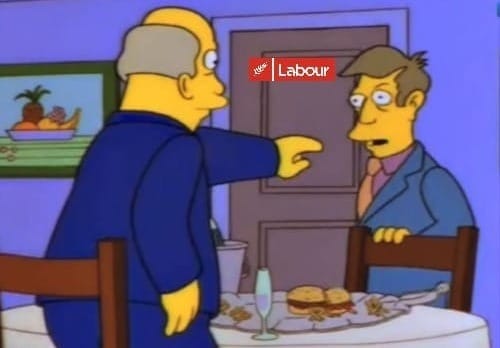What does this week's MFAT proactive release tell us?

On 27 September, Foreign Minister Winston Peters announced at the United Nations General Assembly that his government would not recognise a Palestinian State. The announcement received universal condemnation from anyone with a conscience, even if recognition is a mostly symbolic gesture, completely deficient by itself to respond to the greatest humanitarian catastrophe of the 21st Century.
Notably, this non-decision followed a Cabinet Paper that had been drafted by Peters' office, rather than by officials at the Ministry for Foreign Affairs and Trade (MFAT). While Ministers and their political advisers usually have some input in what Cabinet papers end up looking like (anything from robust feedback to ghost-writing), it is nearly always officials at the relevant department who hold the pen. Interpretation of concepts like 'free and frank advice' and 'political neutrality' may vary from organisation-to-organisation, but most play along with the charade that political decisions are informed by non-political advice.
On Thursday, MFAT proactively released its own advice and correspondence from the lead-up to Peters' trip to the UN. This 111-page compilation, covering a two-month period, provides some interesting context for what led to the man embarrassing us on the world stage.

MFAT was consistent in urging Peters to recognise a Palestinian State
Reading through the proactive release, I was surprised at how strong and unwavering the MEA (MFAT's Middle East and Africa Division) position was throughout the period. My experience of the public sector was one where leaders adopted a looser interpretation of 'free and frank' advice, openly telling staff we weren't allowed to push back on Ministers.
Instead, we have MFAT repeating its view on Palestinian recognition:
• 11 August - a list of suggested talking points for Peters' office that says "New Zealand is ready to be part of the discussion".
• 16 August - the skeleton of a draft Cabinet paper with the recommendation "Agree that the Minister of Foreign Affairs will announce New Zealand's recognition of Palestine at the United Nations in the week of 22 September."
• 17 August - after feedback from Peters' office on the Cabinet Paper, "MEA continues to strongly recommend full recognition without conditions." This is accompanied by a new version of the Cabinet paper recommending "The Minister of Foreign Affairs will make a formal statement and explanation of New Zealand's recognition of the State of Palestine, alongside other countries intending to do so, at relevant meetings during the United Nations Leaders' Week in New York in the week of 22 September."
It was on 18 August that Peters' office changed what it was asking for. At this point, the assignment became an 'options paper' that gives the Minister three options ranging from the status quo to recognition and outlining the pros and cons for each, without pointing towards a 'recommended option'. The MFAT employee seconded to Peters' office emphasises this in a 22 August email: "I am not looking for MFAT's view on what our policy on the recognition question should be (that view has already been tendered)."
Nonetheless, the advice from MEA stayed relatively strong even as the assignment changed:
• 22 August - an internal MFAT email outlining some points from Peters' office that "we should probably push back on..."
• 1 September - MFAT provides talking points for a possible situation in which the Government decides not to recognise a Palestinian state. These are much more critical of Israel than Peters ended up being.
• 3 September - MFAT provides a number of comments on a draft Q&A about recognition, criticising the goverment's framing as creating a 'double standard' between Israel and Palestine. They also provide information with Peters' office about Belgium's decision to recognise Palestine (and sanction Israel!) .
• 25 September - MFAT provides comment on Peters' draft UN statement "Overall, we also wanted to highlight that, tonally (as well as factually) the statement will be very challenging to [redacted]."
This isn't to say that MFAT's advice is somehow radical. It is still the bog standard liberal hand-wringing that clings onto the fantasy of a two-state solution and never misses an opportunity to condemn Hamas or reiterate our "friendship" with Israel. However, it outlines how out-of-step the Government's position ended up being.

It is still unclear when exactly Peters decided against recognition
The proactive release makes it hard to tell exactly when Peters chose the coward's path.
His office definitely seemed open to recognition on 16 August when it sent an email that reads "If he is to take a recognition proposal to Cabinet, it is going to need to be [redacted]." This is reiterated on 17 August: "MFA well understands that MFAT is recommending full/clean recognition [redacted]... Given the above, I am interested in MFAT's view on what is preferable in policy terms: a recognition framed more or less as I have framed it; or no recognition at all at this time (i.e. a continuation of the status quo)."
It isn't clear whether the move to an options paper on 18 August indicated that Peters had already made his mind up about non-recognition. The proactive release only gives us part of the story. Large sections are redacted in line with the Official Information Act (OIA) which likely contain key information. There were likely also phonecalls between officials during the period that are technically covered by the OIA but that weren't included in this release.

Although New Zealand proclaims independence, it cares a lot about what other countries think
In the 1 September media points, MFAT pre-empted a likely question about New Zealand being "out of step with the 160+ countries that have or will recognise a Palestinian state?" The suggested response was as follows:
There is a broad range of strongly held views on this issue. New Zealand's position is based on our principles, values and national interest. Other countries will make their own assessments.
Although the official advice from MFAT had been that New Zealand should recognise Palestine, as it became apparent that this was unlikely to happen, they had to find a way to frame it.
New Zealand has long been proud of its independent foreign policy, this idea that after a bunch of our boys died in the meat-grinder of World War 1, we wouldn't let superpowers tell us what to do. To be fair, there are moments where we have genuinely made decisions "based on our principles, values and national interest" from our nuclear free stance to our refusal to send troops to Iraq. Now, instead of doing the right thing in the face of international pressure, we are stubbornly refusing to do even the bare minimum.
The most obvious explanation is that New Zealand is trying to stay onside with the US, not an unreasonable one given how much our Government looks up to Donald Trump's hard-right government. This almost certainly formed part of the calculus, regardless of how vehemently the government denies such a vulgar accusation.
The release frequently mentions other countries that have recently decided to recognise Palestine: the UK, Canada and Australia frequently appear unredacted. There is that aforementioned section on Belgium, a country that maintains the party line on a two-state solution while still looking to sanctions.
On the other hand, there are "key regional partners" that remain unnamed. An 11 August email seeks the views of partners on recognition:
We are already in active discussions with a number of partners [redacted] and with Wellington based colleagues from key regional parters, [redacted]. The views of this latter group, who have yet to take a decision, are of particular interest and we would value and additional capital based discussion.
The 17 August Cabinet Paper includes the following text: "Note that some of our key partners in Asia - including [redacted] and are currently considering whether to move towards recognition in light of recent events."
This redacted text almost certainly includes some combination of countries like Japan, South Korea and Singapore. Not only did these "key partners" back away from recognition at the same time as us, they all used some variation of the "not if, but when" party line in justifying their cop-out, a phrase that appears throughout the release. Others have already pointed out that these are all countries that rely on American military support.

Perhaps New Zealand was taking its cues from Coldplay-enthusiast Lawrence Wong in the two-months prior to 27 September. I cannot say whether or not this was the case. What this release shows though, is that New Zealand was at odds, not only with the vast majority of people internationally, but with official advice from MFAT.
Recognition would barely be a drop in the ocean of the support Palestine needs to be free from Israel's genocidal occupation. But New Zealand dropped its pants and fell on its ass before it even reached the first hurdle. Shame.




